Sustainability Expo 2024 paves way for low-carbon city
SCG consists of three core business units including cement-building materials, chemicals, and packaging, and the company presented the Low-carbon City model at the Sustainability Expo last week.
The SCG Low-carbon City is an urban development model focused on reducing greenhouse gas emissions by adopting initiatives aimed at promoting a low-carbon lifestyle. The model also promotes green building and urban green spaces to further reduce carbon emissions.
It supports the commercialisation of eco-friendly products and goods, and emphasises waste sorting to facilitate waste elimination and enhance recycling, thereby maximising resource use.
“These achievements are made possible by a shift in mindset, with an emphasis on comprehensive collaboration under an open partnership approach, driven by three core principles with a shared goal: transforming Thailand into a low-carbon society in line with the Nationally Determined Contribution Roadmap,” said Thammasak Sethaudom, Chairman and CEO of SCG.
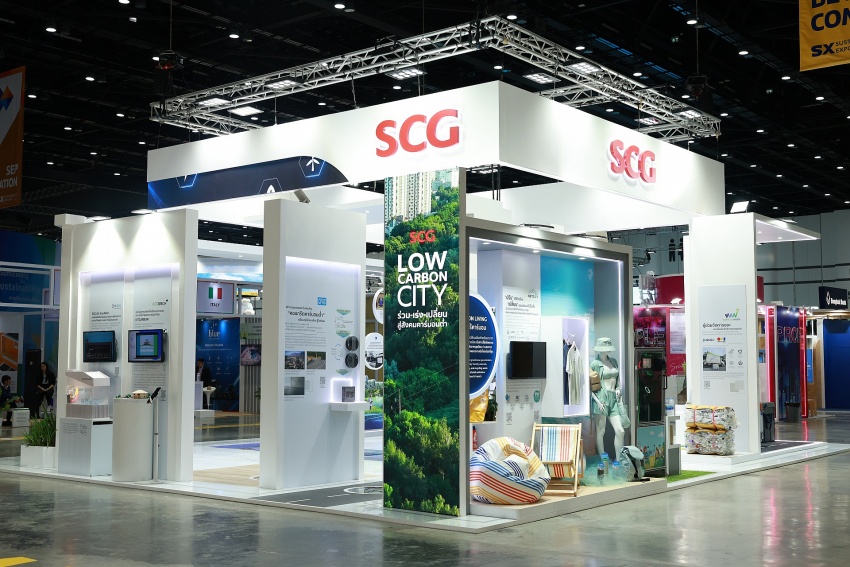 |
| SCG Low Carbon City at Sustainability Expo 2024. Photo: SCG |
The Low Carbon City model was introduced by SCG, showcasing eight key zones.
The first zone is the Saraburi Sandbox, a pilot low-carbon city created through collaboration between the government, private sector, and the public, known as the public-private partnership. Saraburi is the cement capital of Thailand, producing 80 per cent of the country's cement output.
This initiative aims to reduce greenhouse gas emissions by 5 million tonnes of carbon by 2027, with the motto 'What Saraburi can do, other provinces can too.'
"Vietnam has a great potential for implementing Dong Nai Sandbox or Vung Tau Sandbox, only when Vietnam has a strong determination to make it work. If Vietnam really wants to transition the country into the low carbon society, let's start with one city, make it quicker to test and learn. If trying to implement the whole country, it could take a really long cycle to adjust. Start small, ensure the right approach, and then scale it up," said Thammasak.
The second zone features research and experimental projects on energy crops for industrial purposes. The goal is to develop renewable energy from crops, such as biochar from Napier grass and bamboo, to replace coal in cement production, with a replacement rate of up to 55 per cent. The initiative also promotes the use of heat from renewable energy sources like biomass or other energy crops.
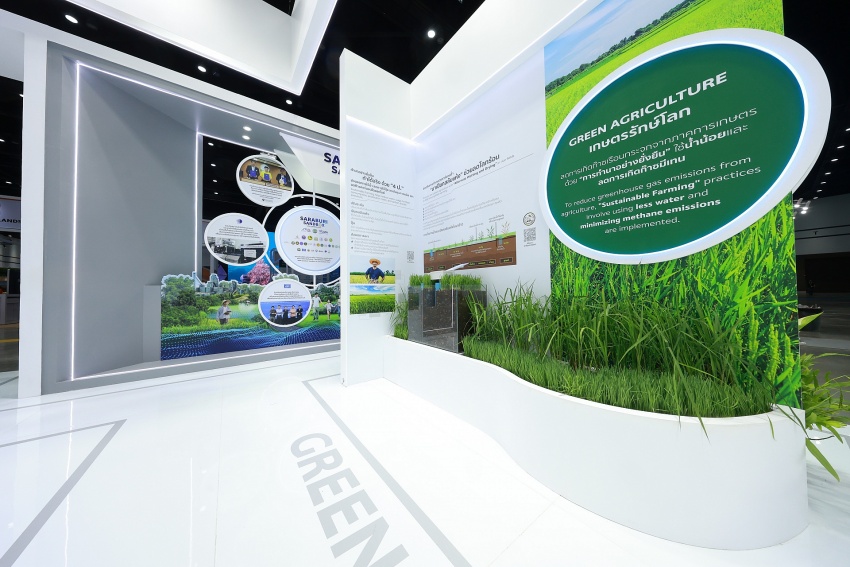 |
| Zone 3: Green agriculture. Photo: SCG |
Zone 3, 4, and 5 focus on green practices in sectors with the highest CO2 emissions, including Green Agriculture, Green Spaces, and Green Logistics.
Green agriculture practices, such as reducing water usage and methane emissions, can help lower greenhouse gas emissions from the agricultural sector.
Expanding green spaces and restoring seagrass beds and forest lands aid in carbon capture, promote biodiversity, and create more eco-tourism destinations, thereby boosting local economies and generating additional income for communities.
The transportation sector is a major contributor to CO2 emissions, so developing energy-efficient technologies and processes can help maintain cleaner air and reduce CO2 emissions.
Focusing on efficient waste management, Zone 6 transforms waste into value by addressing it from households, communities, schools, and factories. This strategy reduces waste and its environmental impact and lowers dependency on natural resources while generating alternative energy.
Promoting a low-carbon lifestyle, Zone 7 encourages the use of eco-friendly materials, resource optimisation, and recycling practices. These initiatives aim to cut CO2 emissions and minimise environmental harm.
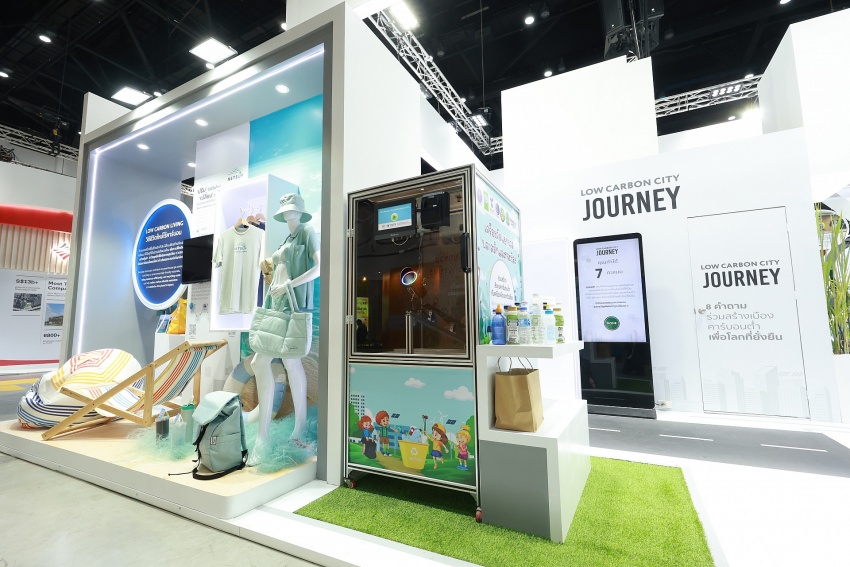 |
| Zone 8: Low-carbon living. Photo: SCG |
In Zone 8, low-carbon living environments are simulated by optimising construction materials and processes. By calculating emissions at each stage, this zone demonstrates how to create more sustainable and environmentally friendly living spaces.
Collaboration among stakeholders plays a crucial role in building a low-carbon city that improves quality of life, creates a livable environment, fosters economic growth, and achieves the Net Zero target by 2025.
“The successful transformation of Saraburi, the industrial hub of the country, into Thailand's first low-carbon city through the PPP model was driven by a shared goal and commitment from all partners. Currently, over 16 hectares of Napier grass are being cultivated in Kaeng Khoi district, Saraburi province, with an expected yield of 2,100 tonnes of alternative energy, generating over $75,000 in annual income for farmers and reducing carbon emissions by 2,500 tonnes of CO2,” said Bancha Chaowarin, Governor of Saraburi.
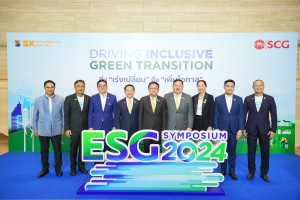 | Accelerating transition to low-carbon society An environmental, social, governance (ESG) symposium 2024 themed ‘Driving Inclusive Green Transition’ hosted by SCG on September 30 aimed to compile and present key proposals and recommendations for accelerating the transition towards clean energy and a circular economy, using the Saraburi Sandbox as a pilot project to create low-carbon society. |
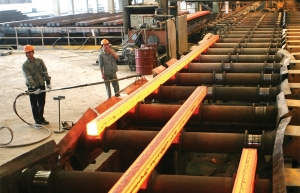 | Carbon market pilot around the corner The local authorities are on track to complete a carbon credit market development scheme in Vietnam, which is careful preparation for establishing a pilot carbon trading platform from next year. |
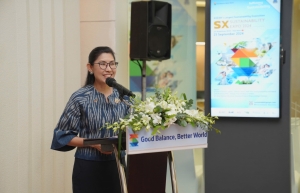 | Sustainability Expo 2024 to kick off in Thailand C asean Vietnam, an entity under ThaiBev Group, is hosting the Production Roadshow 2024 – Vietnam to promote the largest sustainability exposition in ASEAN, Sustainability Expo 2024 (SX2024). |
What the stars mean:
★ Poor ★ ★ Promising ★★★ Good ★★★★ Very good ★★★★★ Exceptional
Related Contents
Latest News
More News
- Trung Nam-Sideros River consortium wins bid for LNG venture (January 30, 2026 | 11:16)
- Vietnam moves towards market-based fuel management with E10 rollout (January 30, 2026 | 11:10)
- Envision Energy, REE Group partner on 128MW wind projects (January 30, 2026 | 10:58)
- Vingroup consults on carbon credits for electric vehicle charging network (January 28, 2026 | 11:04)
- Bac Ai Pumped Storage Hydropower Plant to enter peak construction phase (January 27, 2026 | 08:00)
- ASEAN could scale up sustainable aviation fuel by 2050 (January 24, 2026 | 10:19)
- 64,000 hectares of sea allocated for offshore wind surveys (January 22, 2026 | 20:23)
- EVN secures financing for Quang Trach II LNG power plant (January 17, 2026 | 15:55)
- PC1 teams up with DENZAI on regional wind projects (January 16, 2026 | 21:18)
- Innovation and ESG practices drive green transition in the digital era (January 16, 2026 | 16:51)

 Tag:
Tag:



















 Mobile Version
Mobile Version